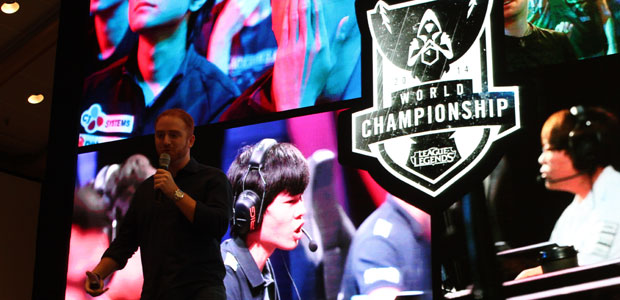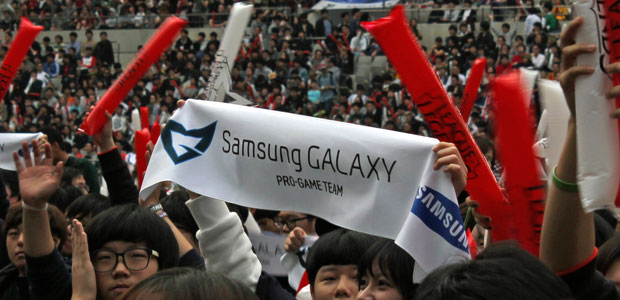Wot I Learned: League Of Legends Q&A
Future planning for Summoner's Rift and beyond
On the eve of the biggest event in the League of Legends calendar – the World Championship finals – Riot were in the mood for a Q&A. To that end, founders Marc Merrill and Brandon Beck took to a little stage in Seoul's World Cup Stadium, alongside Vice President of eSports Dustin Beck. They were sitting on metal stools holding mics, so I was vaguely wondering whether there would be an announcement like "Well, this eSports stuff is great and all but we've decided to form a boyband."
That didn't happen, more's the pity. They also didn't use the term "esport-thlete" for pro gamers. Seriously. What's it going to take to get that one into common parlance? In fairness, despite the aforementioned shortcomings they did say a fair bit about the direction they're hoping to take LoL over the coming year – particularly the competitive side of things. I've pulled out some of the themes and highlights for your consideration below and also added in a few bits and bobs from my own brainbone.
The International Scene
There was a lot of emphasis on joining up the various professional League scenes from different regions. To that end 2015 should feature more tournaments which have an international focus – the ones mentioned were a top team All Star-style event in May, and a more irreverent tournament during next year's off-season. Riot's own localised teams are in "heavy planning mode" with regards to season 5, although none of the details on that front are ready for sharing so there might be some info on that level at a later date. In terms of an official international league, it's something Riot consider frequently but there are no plans at present because "it's not necessarily viable for teams in different corners of the planet to meet on a regular basis logistically".
There was a related question about regional imbalance and whether Riot would be tweaking anything to affect or perhaps temper Korean team dominance. The response was essentially "no", but it came with an observation that "we're also seeing more players from Korea – and internationally – cross-pollinate other leagues." Essentially, as players move around they take a certain amount of regional expertise and meta knowledge with them.
Given the meta changes over time that might become less and less useful in terms of offering an insider perspective but it can offer valuable insight as well as broadening the team's contacts (which can also help with arranging scrims). Relatedly, Riot recently introduced a global policy to prevent teams from a region being entirely populated by players from overseas. For EU and NA regions this means a residency requirement where three of the starting five players have to have been residents in that region for at least two years (well, 24 months out of the prior 36).
Visa Shenanigans
If you'll cast your mind back to when the LCS had a live event in Wembley earlier this year, you'll probably remember that one team – Gambit Gaming – had massive visa issues due to the late notice of the event. As a result they ended up fielding a team composed almost entirely of substitutes for those games. It was a frustrating experience, and one that Riot says it has learned from. Next season's events are thus being planned months in advance to avoid the same situation happening again. I'm mentioning that here partly because the Gambit issue was the only bum note in an otherwise really positive and enjoyable event, and partly because the response touched on the development of eSports as a recognised professional activity in the same vein as sports:
"The visa situation differs from country to county. As more and more governments like the US government start to recognise esports athletes with special visa status it will also make these types of challenge far less common."
League Of Ladies
The subject of female players' access to competitive League of Legends and problematic views of women as players expressed by other eSports organisations came up in questions. Riot's response was that "It's just a matter of time before there's either all-female teams or very successful female pros". The company isn't looking at ways to actively facilitate anything on that front, which implies they want to treat eSports as purely a meritocracy. They're relying on expanding the game's general audience and playerbase to add more women to the pool of potential professional players.
I don't think there are easy answers here, but for me it comes down to a problem of access points and codified behaviours. It's about general ways in which women (and minority groups) can be disadvantaged in terms of their options for joining in or feeling welcome. I don't think simply increasing the volume of the playerbase will deal with those underlying issues, as it presumably wouldn't affect the overall ratio of female to male players. It also doesn't directly address any of the structural or access-based problems – sponsor or marketing approaches when it comes to depicting women, economic disadvantages which can affect access to gaming PCs, problems with organising practice matches with other teams and so on. Riot's statement is predicated on the assumption that the situation will change organically; that it's not the company's responsibility to expedite or facilitate that process.
Welcome To The Jungle
An area where Riot is taking a more active role is in tinkering with the game itself. "We always want to see metas change and evolve and players be able to express themselves strategically," was how they put it. To that end Season 5 is expected to bring some big changes, particularly in terms of how the jungle works. At the moment you can see a lot of the potential tweaks in the Public Beta Environment – camps giving extra rewards if you use Smite, increased base difficulty of jungling, big changes to what you get for killing Baron and Dragon.
According to Riot, "The goal is to provide more ways for the players to express themselves strategically. Part of that involves making more champions more viable. The jungle champion pool has been really narrow. We want to see a broader range of junglers in the mix and give those junglers more strategic choices to really make the jungle one of the most strategic roles in all of League in terms of itemisation and thinking through play."
Overall it sounds like Riot aren't worried about the general viability of their champions, though. "It's a thrill to see strange combinations – Hecarim mid, Poppy carry, Riven jungle. Even if there are champions that are rarely played a very large percentage of the champion pool is viable. But oftentimes it come with risks or tradeoffs where players or teams don't feel as comfortable busting out those champions except in rare circumstances. Like the famous game five Heimerdinger push strat that happened a couple of years ago in Korea.
"It's not a goal for us to have every champion be constantly viable for competitive play because we like having the deep hard tradeoffs that certain wacky champs bring to the game, even if they're rarely seen in competitive play."
Branding Upon Branding
Lastly, I was interested in their response to a question about corporate sponsorship. Essentially, pro gaming teams often include the name of their sponsors in the name of their team, so was Riot concerned about this getting out of hand? Samsung White and NaJin White Shield are two examples here. According to Brandon Beck, "There are potentially challenges associated with that. Making team names longer or potentially trivialising organisations. I think ultimately we want the most tasteful and best long term solution for the sports and sponsors. I think the sponsors would be on board with [that]. It's an open question and something we're trying to wrap our heads around."
It's not a definitive response at all, but it implies that Riot is keeping an eye on the naming situation. For me that's important because the team name is part of a continuous team identity and sponsors shouldn't generally be an overwhelming part of that as they can get switched around. Teams also have multiple sponsors so there would be a danger of the situation escalating and team names getting clogged up with a string of brand names.




